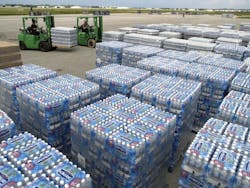FDA Does Not Consider Bottled Water Stored in Elevated Temps a Safety Concern
Claims that plastic bottled water containers stored in warm environments (e.g., a hot automobile) “leach” unnamed chemicals that cause breast cancer or other maladies are not based in science and are unsubstantiated, according to the U.S. Food and Drug Administration (FDA). There are no studies that prove this theory, instead, these allegations have been perpetuated by viral emails and media hype that only frighten and confuse consumers.
The FDA comprehensively regulates the safety of foods and beverages, including bottled water. This includes a careful review of food and beverage packaging materials, including plastics, before allowing them on the market. With respect to leaving bottled water in a hot car, FDA has stated:
- “It is true that exposing the bottle to higher temperatures may imply a greater degree of migration of substances from the plastic to the water [ed. note: or other beverages in similar containers]. However, in its safety review, the FDA takes into account exposures to higher temperatures, such as during storage and transportation of bottled water prior to sale, in its estimates of potential levels of migration of substances from the plastic to the water.”
- “The levels of migration expected, including during periods of exposure to elevated temperatures in storage and transport (such as might be experienced in a closed vehicle in the sun) have, as discussed above, been determined by the agency to be well within the margin of safety. Therefore, the agency does not consider this situation to be a safety concern.”
For approved plastics, FDA has found that the levels of migration to food of the substances due to the use of the plastics in contact with food are well within the margin of safety based on information available to the agency. This means no short or long-term health effects are likely to occur, even from life-long, daily dietary exposure to these substances migrating from plastic food-contact materials.
The International Bottled Water Association (IBWA) does urge consumers to handle and store bottled water containers with the same care and respect as they would any other food or beverage product.
Source: IBWA
